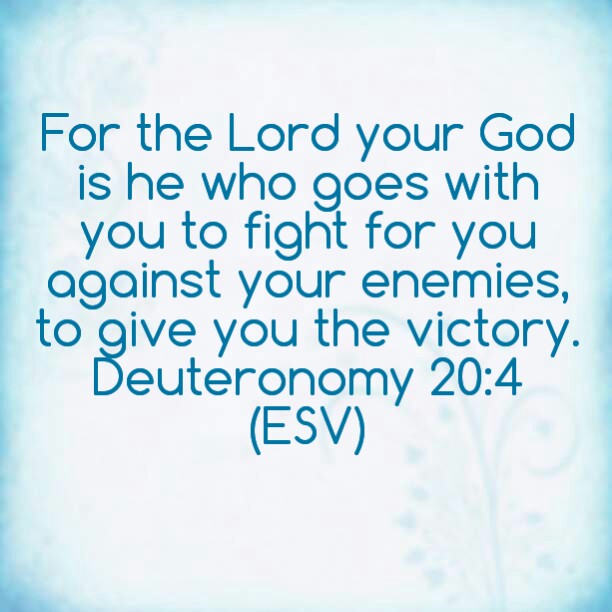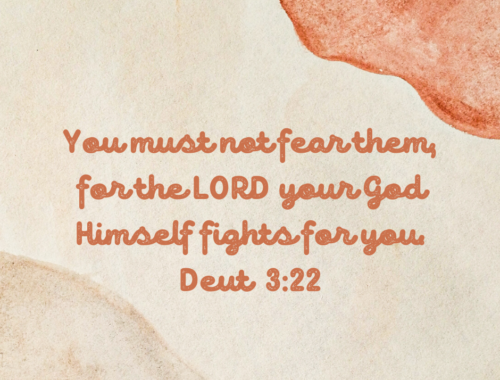Deuteronomy Chapter 20

In Times of War: The Ethics and Character of God
In dramatic performances, fight scenes are choreographed to make known the true characters of the protagonists. These are occasions when stakes are high. Those involved are to make decisions in the face of death. In the Book of Deuteronomy, Moses’ last words to the chosen are to prepare them for a series of wars that they will fight after entering into the land of Canaan.
In chapter 20, God highlights matters concerning war procedures and exemption. Reading this chapter along with other chapters in the book concerning war, we catch a glimpse of God’s character and His ethics. In this devotional I invite you to reflect together on some of my observations:
- The battle belongs to God. He is the one that fights and goes before His people (Deut 1:30). Without His presence, it is a definite no-win situation, even if there were to be a great number of soldiers.
- Listen and follow. Those involved in the war may inquire, negotiate with or express preferences (if one is close enough) to God. Abraham, Moses and Hezekiah are some examples that come to mind. Yet, never insist. If God were to concede, those who insist will suffer the consequence that God has hoped to evade (Deut 1).
- Take only what is promised. Everything else leave or destroy (Deut 2: 9, 17, 24, 34, 35; Deut 3: 5, 6; Deut 20: 17, 18).
- Aim for efficiency and minimal destruction. Initiate peace talk first. Wars are the only last resort (Deut 20: 10). If there is a need for consuming resources to support the war, such as cutting down trees, the trees must be non fruit-bearing (Deut 20: 19, 20). Fruit-bearing trees are reserved for sustenance.
- Fight with totality and fearlessness (Deut 20: 1). If there is fear or if one is half way through another project, such as building a house, making an offering or getting married, one may be exempted from war. Ultimately, God wants his people to clearly understand that the battle belongs to Him and He has no need of soldiers. We are not fighting for Him; He is fighting for us.
In the larger picture of things, physical warfare is only part of the everyday spiritual warfare that the chosen have to fight until the end of their lives. God’s ultimate desire is to have His blessing remain with His people as a collective for as long as possible (Deut 15: 5 and 6). The blessing has been promised but His people must fight in order to receive and to maintain it. This is also the very reason that the chosen enter into war, and battle fields are thus ubiquitous.
Deuteronomy can thus be conceived as a how-to manual that instructs the chosen on the ethics of everyday living so they may ultimately win their spiritual battle. In it, Moses instructs on multiple aspects of life. These include warfare (as previously discussed), military service, marriage, domestic conflicts, legal affairs, social welfare, religious practices, sanitary care, charity and funeral rites.
God’s instructions also well-reflect what is being human. His instruction is conceived and given with the challenges and struggles the chosen will face in mind. God knows well that in spiritual battles His people will need to struggle inwardly within themselves. They may know what is ethical but fail to do it. They may know what is unethical but end up committing it. They may also try to reconcile the discrepancy between intention and action through pretence.
God therefore highlights to His people their weaknesses that may prevent them from victory. For example, what is visible will always be more reassuring than what is invisible. God therefore forewarns His people to shy away from idols and images (Deut 4:16, 23, 30). Power is attractive to possess. Yet God insists that when one is in a position of power, that power is to be used to release, liberate and provide, not to oppress (Deut 10:18; Deut 24: 10-13; 14 and 15; 25: 4). When there is a potential conflict of interests, God knows human beings will have a hard time relinquishing their rights and interests (Deut 22:1-4; 24:10-22). He therefore reminds His people that He is present in all human relationships (Deut 24: 13 and 15).
God also foregrounds the importance of aligning action with intention when fighting spiritual battles. Action and intention are separate things. These two must be addressed separately but in tandem. For example, when lending to brothers, do it willingly from the heart (Deut 15: 10 and 11). When going into war, do so only when there is totality (Deut 20: 1-9). One may favour someone over others, but there should be no favouritism in one’s treatment of those concerned (Deut 21:15). The atrocious act of murder needs to be differentiated by the intention of the murderer to ensure justice. Unintended murder is pardonable as accidents can happen (Deut 4:42). Yet murder motivated by hatred is condemned. Ultimately, waging in spiritual battles is about conquering the weaknesses of being human to become better human beings, who are closer to the likeness of God (Deut 18:13).
I am certain that you and I have our own battles to fight in life, be they big or small. How can we be of mutual support rather than of hindrance towards winning the battles? What are some of the challenges we encounter? How can we work together to overcome these challenges? I leave these questions for your consideration and discussion.

